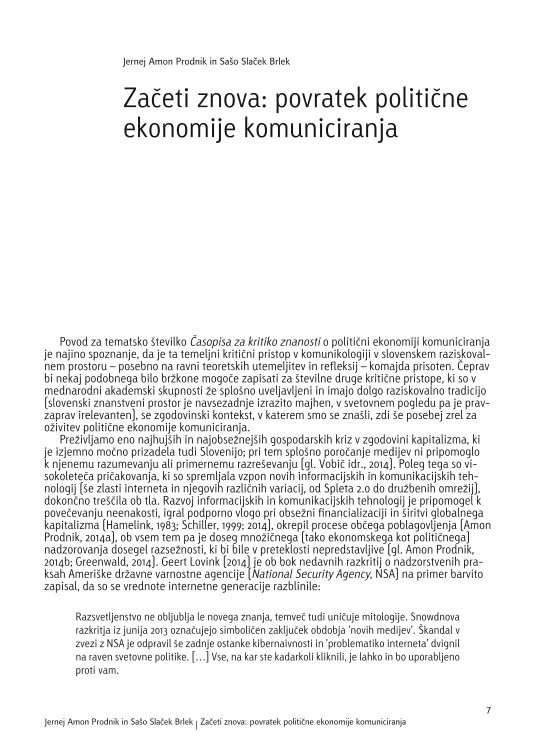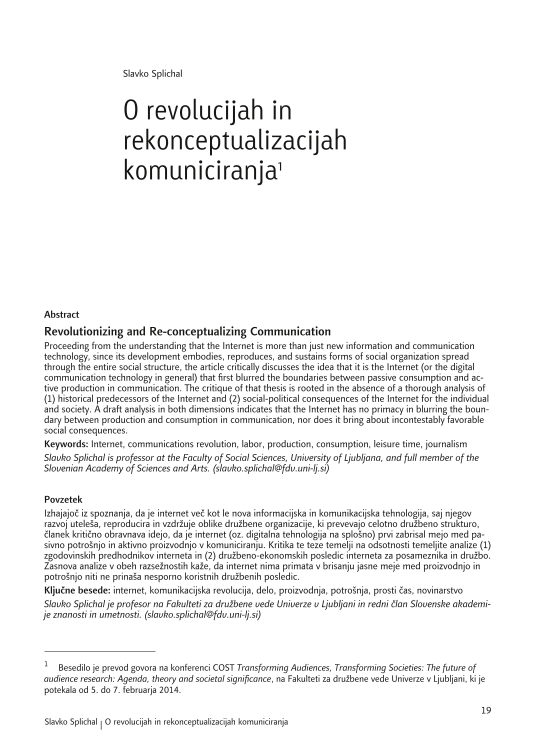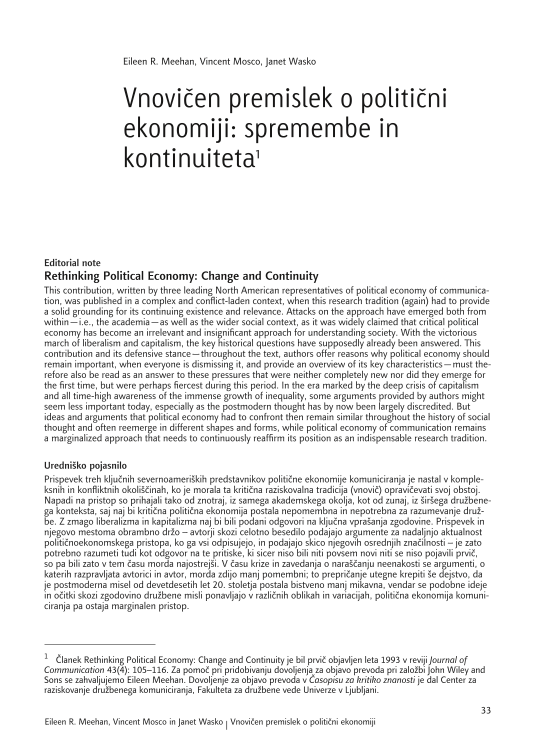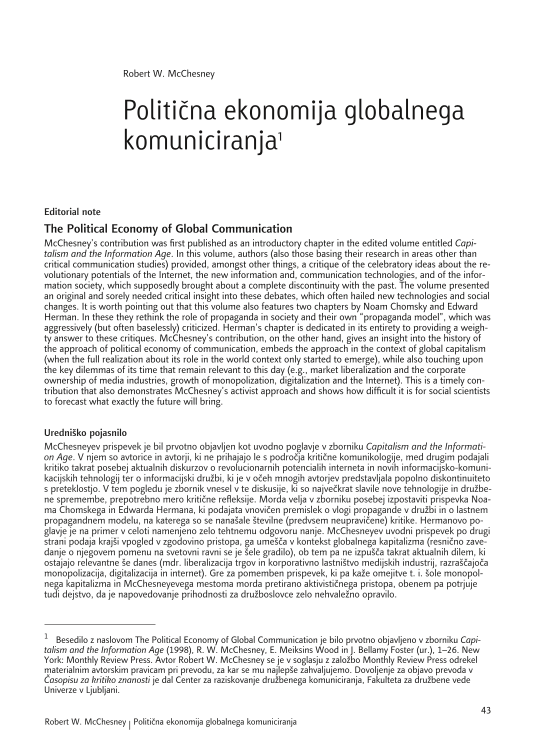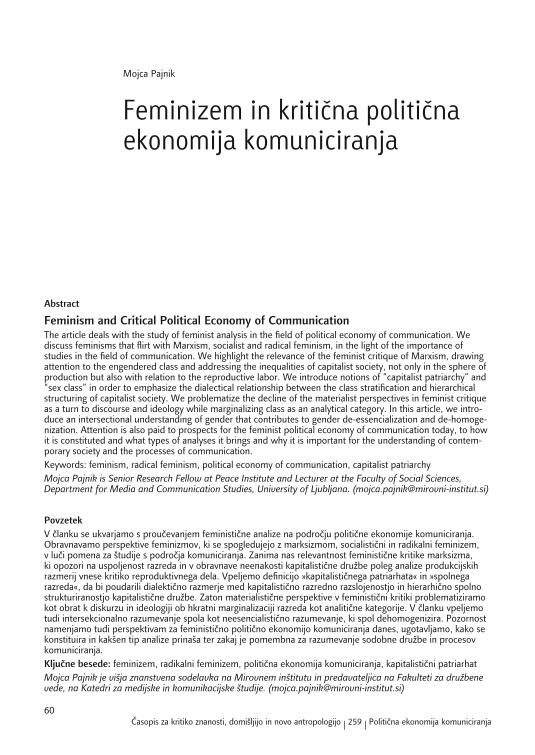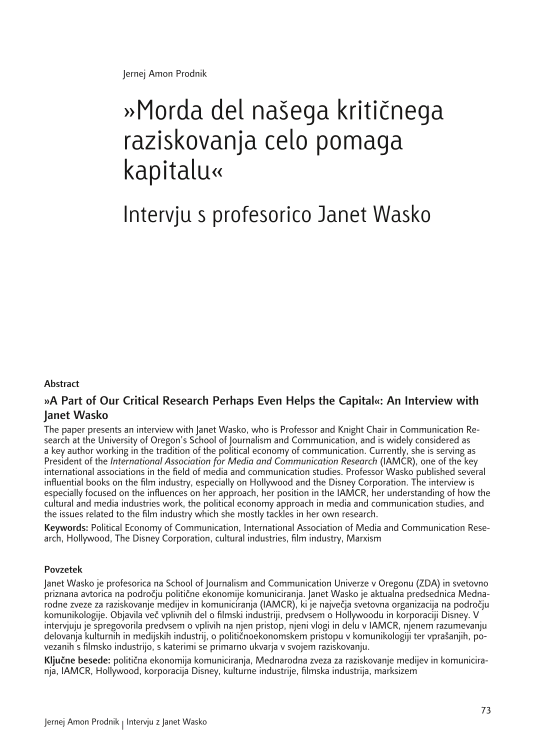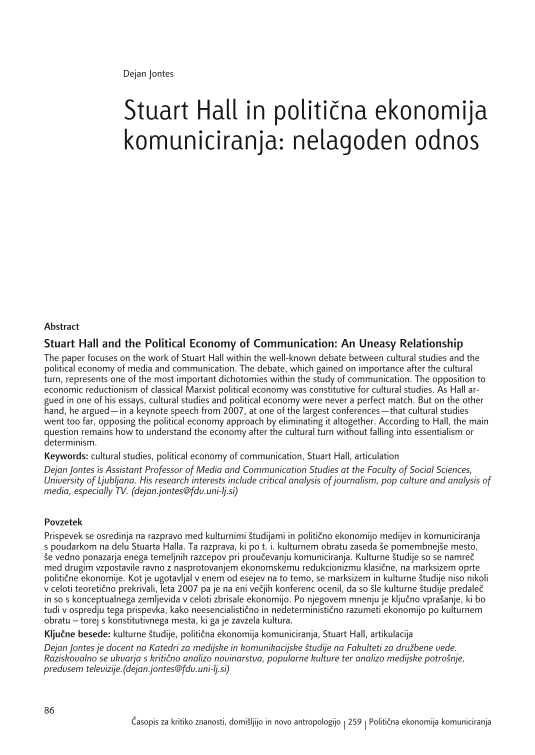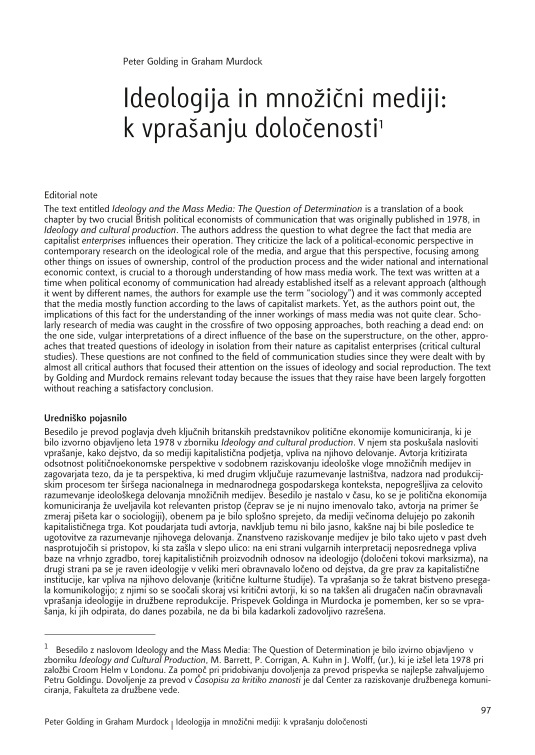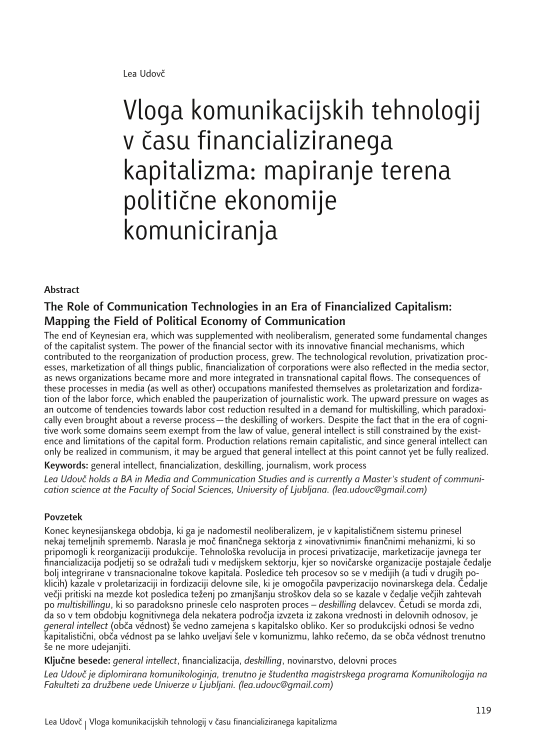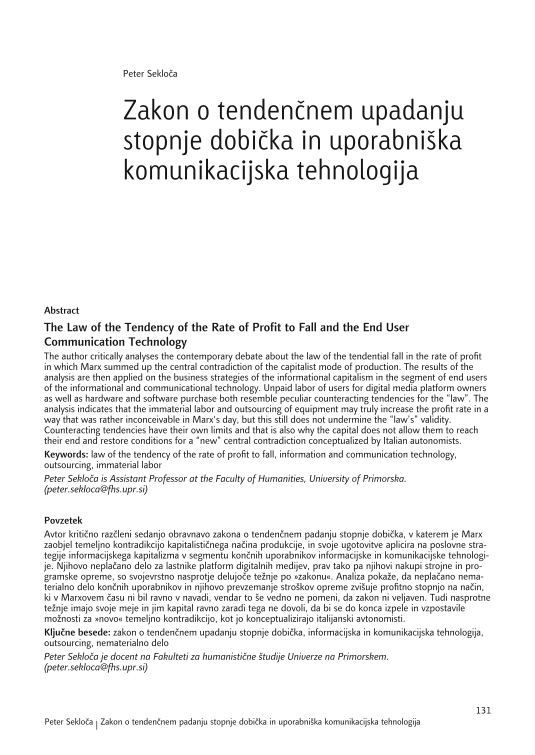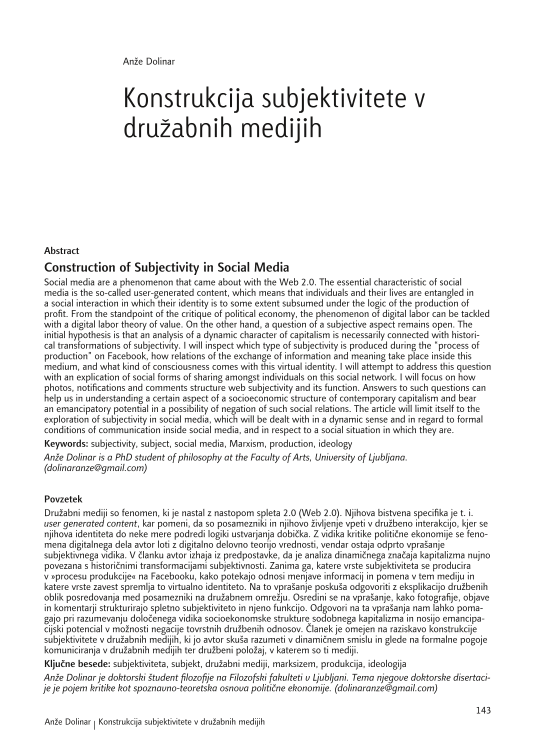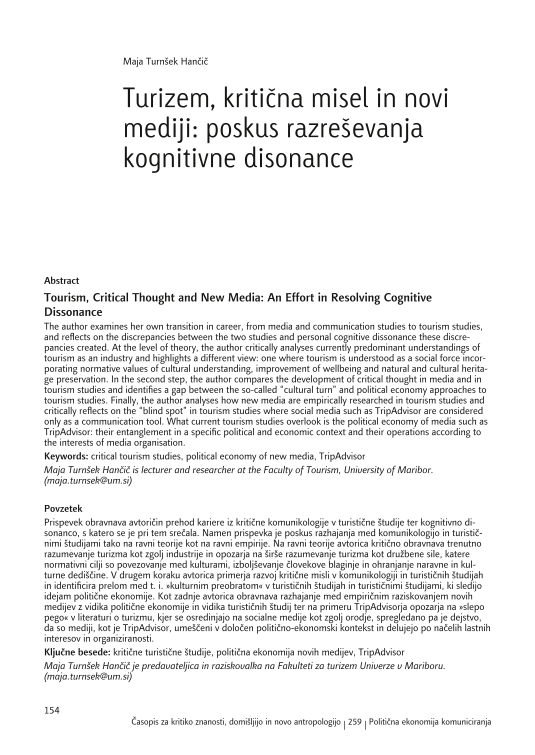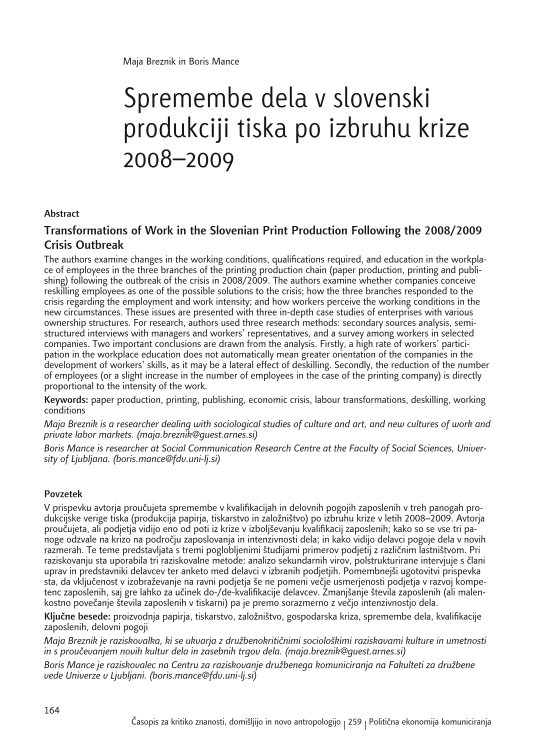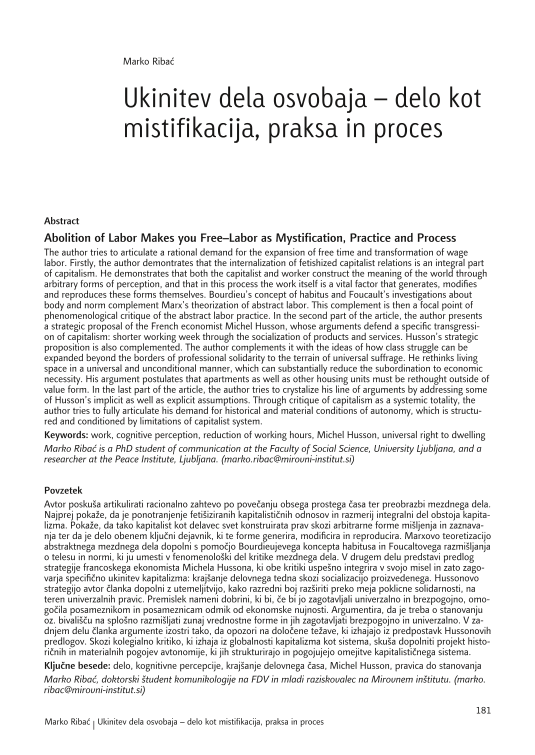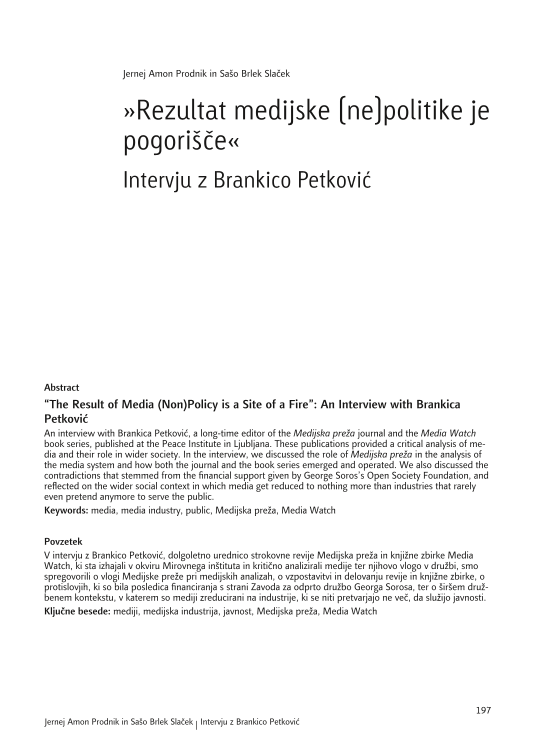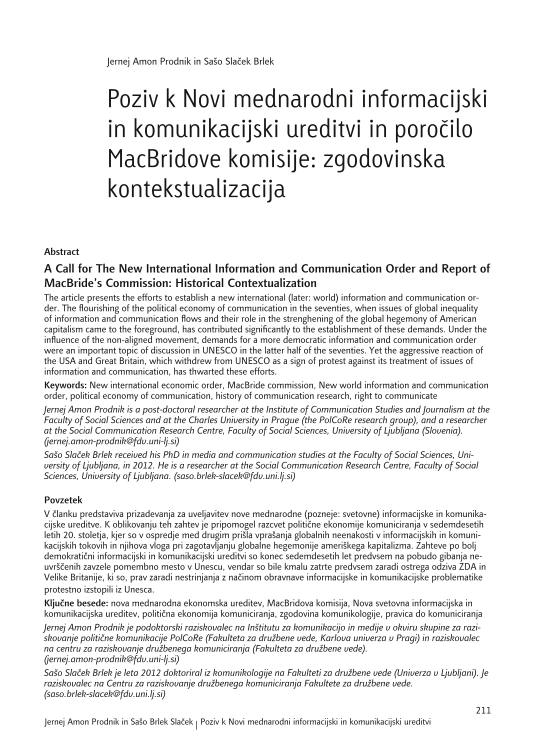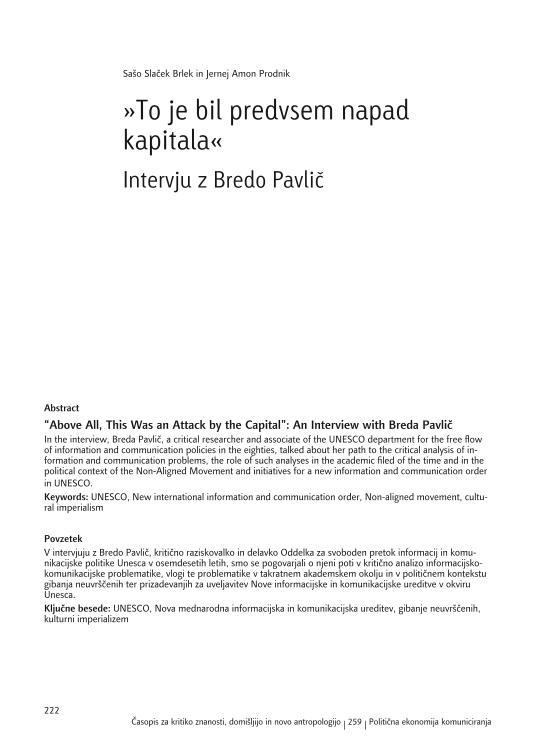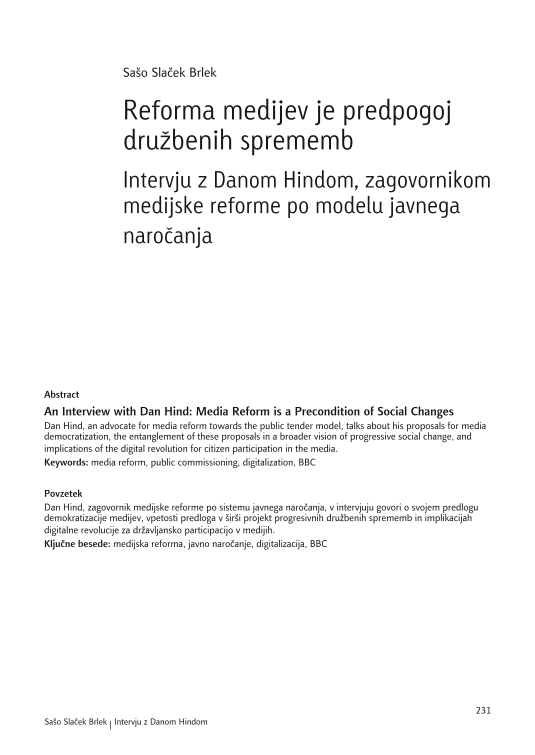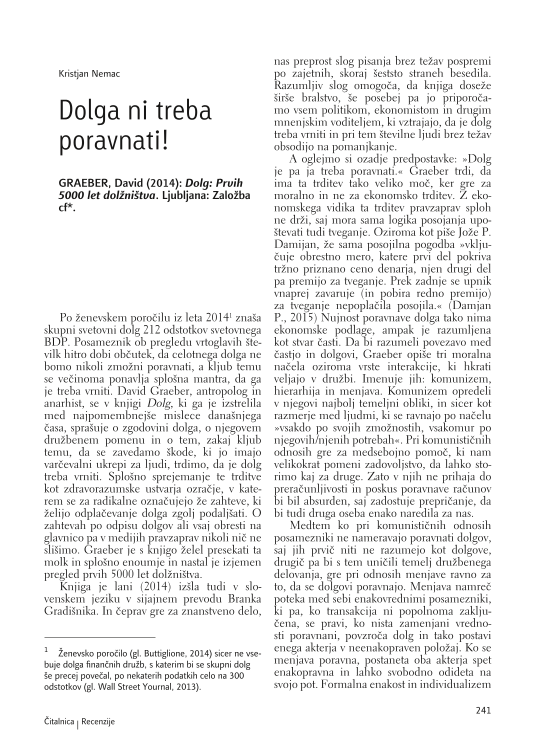Povod za tematsko številko Časopisa za kritiko znanosti o politični ekonomiji komuniciranja je najino spoznanje, da je ta temeljni kritični pristop v komunikologiji v slovenskem raziskovalnem prostoru – posebno na ravni teoretskih utemeljitev in refleksij – komajda prisoten. Čeprav bi nekaj podobnega bilo bržkone mogoče zapisati za številne druge kritične pristope, ki so v mednarodni akademski skupnosti že splošno uveljavljeni in imajo dolgo raziskovalno tradicijo (slovenski znanstveni prostor je navsezadnje izrazito majhen, v svetovnem pogledu pa je pravzaprav irelevanten), se zgodovinski kontekst, v katerem smo se znašli, zdi še posebej zrel za oživitev politične ekonomije komuniciranja.
Proceeding from the understanding that the Internet is more than just new information and communication technology, since its development embodies, reproduces, and sustains forms of social organization spread through the entire social structure, the article critically discusses the idea that it is the Internet (or the digital communication technology in general) that first blurred the boundaries between passive consumption and active production in communication. The critique of that thesis is rooted in the absence of a thorough analysis of (1) historical predecessors of the Internet and (2) social-political consequences of the Internet for the individual and society. A draft analysis in both dimensions indicates that the Internet has no primacy in blurring the boundary between production and consumption in communication, nor does it bring about incontestably favorable social consequences.
This contribution, written by three leading North American representatives of political economy of communication, was published in a complex and conflict-laden context, when this research tradition (again) had to provide a solid grounding for its continuing existence and relevance. Attacks on the approach have emerged both from within—i.e., the academia—as well as the wider social context, as it was widely claimed that critical political economy has become an irrelevant and insignificant approach for understanding society. With the victorious march of liberalism and capitalism, the key historical questions have supposedly already been answered. This contribution and its defensive stance—throughout the text, authors offer reasons why political economy should remain important, when everyone is dismissing it, and provide an overview of its key characteristics—must therefore also be read as an answer to these pressures that were neither completely new nor did they emerge for the first time, but were perhaps fiercest during this period. In the era marked by the deep crisis of capitalism and all time-high awareness of the immense growth of inequality, some arguments provided by authors might seem less important today, especially as the postmodern thought has by now been largely discredited. But ideas and arguments that political economy had to confront then remain similar throughout the history of social thought and often reemerge in different shapes and forms, while political economy of communication remains a marginalized approach that needs to continuously reaffirm its position as an indispensable research tradition.
McChesney’s contribution was first published as an introductory chapter in the edited volume entitled Capitalism and the Information Age. In this volume, authors (also those basing their research in areas other than critical communication studies) provided, amongst other things, a critique of the celebratory ideas about the revolutionary potentials of the Internet, the new information and, communication technologies, and of the information society, which supposedly brought about a complete discontinuity with the past. The volume presented an original and sorely needed critical insight into these debates, which often hailed new technologies and social changes. It is worth pointing out that this volume also features two chapters by Noam Chomsky and Edward Herman. In these they rethink the role of propaganda in society and their own “propaganda model”, which was aggressively (but often baselessly) criticized. Herman’s chapter is dedicated in its entirety to providing a weighty answer to these critiques. McChesney’s contribution, on the other hand, gives an insight into the history of the approach of political economy of communication, embeds the approach in the context of global capitalism (when the full realization about its role in the world context only started to emerge), while also touching upon the key dilemmas of its time that remain relevant to this day (e.g., market liberalization and the corporate ownership of media industries, growth of monopolization, digitalization and the Internet). This is a timely contribution that also demonstrates McChesney’s activist approach and shows how difficult it is for social scientists to forecast what exactly the future will bring.
The article deals with the study of feminist analysis in the field of political economy of communication. We discuss feminisms that flirt with Marxism, socialist and radical feminism, in the light of the importance of studies in the field of communication. We highlight the relevance of the feminist critique of Marxism, drawing attention to the engendered class and addressing the inequalities of capitalist society, not only in the sphere of production but also with relation to the reproductive labor. We introduce notions of “capitalist patriarchy” and “sex class” in order to emphasize the dialectical relationship between the class stratification and hierarchical structuring of capitalist society. We problematize the decline of the materialist perspectives in feminist critique as a turn to discourse and ideology while marginalizing class as an analytical category. In this article, we introduce an intersectional understanding of gender that contributes to gender de-essencialization and de-homogenization. Attention is also paid to prospects for the feminist political economy of communication today, to how it is constituted and what types of analyses it brings and why it is important for the understanding of contemporary society and the processes of communication.
»A Part of Our Critical Research Perhaps Even Helps the Capital«: An Interview with Janet Wasko
(
The paper presents an interview with Janet Wasko, who is Professor and Knight Chair in Communication Research at the University of Oregon’s School of Journalism and Communication, and is widely considered as a key author working in the tradition of the political economy of communication. Currently, she is serving as President of the International Association for Media and Communication Research (IAMCR), one of the key international associations in the field of media and communication studies. Professor Wasko published several influential books on the film industry, especially on Hollywood and the Disney Corporation. The interview is especially focused on the influences on her approach, her position in the IAMCR, her understanding of how the cultural and media industries work, the political economy approach in media and communication studies, and the issues related to the film industry which she mostly tackles in her own research.
The paper focuses on the work of Stuart Hall within the well-known debate between cultural studies and the political economy of media and communication. The debate, which gained on importance after the cultural turn, represents one of the most important dichotomies within the study of communication. The opposition to economic reductionism of classical Marxist political economy was constitutive for cultural studies. As Hall argued in one of his essays, cultural studies and political economy were never a perfect match. But on the other hand, he argued—in a keynote speech from 2007, at one of the largest conferences—that cultural studies went too far, opposing the political economy approach by eliminating it altogether. According to Hall, the main question remains how to understand the economy after the cultural turn without falling into essentialism or determinism.
Editorial note The text entitled Ideology and the Mass Media: The Question of Determination is a translation of a book chapter by two crucial British political economists of communication that was originally published in 1978, in Ideology and cultural production. The authors address the question to what degree the fact that media are capitalist enterprises influences their operation. They criticize the lack of a political-economic perspective in contemporary research on the ideological role of the media, and argue that this perspective, focusing among other things on issues of ownership, control of the production process and the wider national and international economic context, is crucial to a thorough understanding of how mass media work. The text was written at a time when political economy of communication had already established itself as a relevant approach (although it went by different names, the authors for example use the term “sociology”) and it was commonly accepted that the media mostly function according to the laws of capitalist markets. Yet, as the authors point out, the implications of this fact for the understanding of the inner workings of mass media was not quite clear. Scholarly research of media was caught in the crossfire of two opposing approaches, both reaching a dead end: on the one side, vulgar interpretations of a direct influence of the base on the superstructure, on the other, approaches that treated questions of ideology in isolation from their nature as capitalist enterprises (critical cultural studies). These questions are not confined to the field of communication studies since they were dealt with by almost all critical authors that focused their attention on the issues of ideology and social reproduction. The text by Golding and Murdock remains relevant today because the issues that they raise have been largely forgotten without reaching a satisfactory conclusion.
The end of Keynesian era, which was supplemented with neoliberalism, generated some fundamental changes of the capitalist system. The power of the financial sector with its innovative financial mechanisms, which contributed to the reorganization of production process, grew. The technological revolution, privatization processes, marketization of all things public, financialization of corporations were also reflected in the media sector, as news organizations became more and more integrated in transnational capital flows. The consequences of these processes in media (as well as other) occupations manifested themselves as proletarization and fordization of the labor force, which enabled the pauperization of journalistic work. The upward pressure on wages as an outcome of tendencies towards labor cost reduction resulted in a demand for multiskilling, which paradoxically even brought about a reverse process—the deskilling of workers. Despite the fact that in the era of cognitive work some domains seem exempt from the law of value, general intellect is still constrained by the existence and limitations of the capital form. Production relations remain capitalistic, and since general intellect can only be realized in communism, it may be argued that general intellect at this point cannot yet be fully realized.
The Law of the Tendency of the Rate of Profit to Fall and the End User Communication Technology
(
The author critically analyses the contemporary debate about the law of the tendential fall in the rate of profit in which Marx summed up the central contradiction of the capitalist mode of production. The results of the analysis are then applied on the business strategies of the informational capitalism in the segment of end users of the informational and communicational technology. Unpaid labor of users for digital media platform owners as well as hardware and software purchase both resemble peculiar counteracting tendencies for the “law”. The analysis indicates that the immaterial labor and outsourcing of equipment may truly increase the profit rate in a way that was rather inconceivable in Marx's day, but this still does not undermine the “law’s” validity. Counteracting tendencies have their own limits and that is also why the capital does not allow them to reach their end and restore conditions for a “new” central contradiction conceptualized by Italian autonomists.
Social media are a phenomenon that came about with the Web 2.0. The essential characteristic of social media is the so-called user-generated content, which means that individuals and their lives are entangled in a social interaction in which their identity is to some extent subsumed under the logic of the production of profit. From the standpoint of the critique of political economy, the phenomenon of digital labor can be tackled with a digital labor theory of value. On the other hand, a question of a subjective aspect remains open. The initial hypothesis is that an analysis of a dynamic character of capitalism is necessarily connected with historical transformations of subjectivity. I will inspect which type of subjectivity is produced during the “process of production” on Facebook, how relations of the exchange of information and meaning take place inside this medium, and what kind of consciousness comes with this virtual identity. I will attempt to address this question with an explication of social forms of sharing amongst individuals on this social network. I will focus on how photos, notifications and comments structure web subjectivity and its function. Answers to such questions can help us in understanding a certain aspect of a socioeconomic structure of contemporary capitalism and bear an emancipatory potential in a possibility of negation of such social relations. The article will limit itself to the exploration of subjectivity in social media, which will be dealt with in a dynamic sense and in regard to formal conditions of communication inside social media, and in respect to a social situation in which they are.
The author examines her own transition in career, from media and communication studies to tourism studies, and reflects on the discrepancies between the two studies and personal cognitive dissonance these discrepancies created. At the level of theory, the author critically analyses currently predominant understandings of tourism as an industry and highlights a different view: one where tourism is understood as a social force incorporating normative values of cultural understanding, improvement of wellbeing and natural and cultural heritage preservation. In the second step, the author compares the development of critical thought in media and in tourism studies and identifies a gap between the so-called “cultural turn” and political economy approaches to tourism studies. Finally, the author analyses how new media are empirically researched in tourism studies and critically reflects on the “blind spot” in tourism studies where social media such as TripAdvisor are considered only as a communication tool. What current tourism studies overlook is the political economy of media such as TripAdvisor: their entanglement in a specific political and economic context and their operations according to the interests of media organisation.
Transformations of Work in the Slovenian Print Production Following the 2008/2009 Crisis Outbreak
(
The authors examine changes in the working conditions, qualifications required, and education in the workplace of employees in the three branches of the printing production chain (paper production, printing and publishing) following the outbreak of the crisis in 2008/2009. The authors examine whether companies conceive reskilling employees as one of the possible solutions to the crisis; how the three branches responded to the crisis regarding the employment and work intensity; and how workers perceive the working conditions in the new circumstances. These issues are presented with three in-depth case studies of enterprises with various ownership structures. For research, authors used three research methods: secondary sources analysis, semistructured interviews with managers and workers’ representatives, and a survey among workers in selected companies. Two important conclusions are drawn from the analysis. Firstly, a high rate of workers’ participation in the workplace education does not automatically mean greater orientation of the companies in the development of workers’ skills, as it may be a lateral effect of deskilling. Secondly, the reduction of the number of employees (or a slight increase in the number of employees in the case of the printing company) is directly proportional to the intensity of the work.
The author tries to articulate a rational demand for the expansion of free time and transformation of wage labor. Firstly, the author demontrates that the internalization of fetishized capitalist relations is an integral part of capitalism. He demonstrates that both the capitalist and worker construct the meaning of the world through arbitrary forms of perception, and that in this process the work itself is a vital factor that generates, modifies and reproduces these forms themselves. Bourdieu’s concept of habitus and Foucault’s investigations about body and norm complement Marx’s theorization of abstract labor. This complement is then a focal point of phenomenological critique of the abstract labor practice. In the second part of the article, the author presents a strategic proposal of the French economist Michel Husson, whose arguments defend a specific transgression of capitalism: shorter working week through the socialization of products and services. Husson’s strategic proposition is also complemented. The author complements it with the ideas of how class struggle can be expanded beyond the borders of professional solidarity to the terrain of universal suffrage. He rethinks living space in a universal and unconditional manner, which can substantially reduce the subordination to economic necessity. His argument postulates that apartments as well as other housing units must be rethought outside of value form. In the last part of the article, the author tries to crystalize his line of arguments by addressing some of Husson’s implicit as well as explicit assumptions. Through critique of capitalism as a systemic totality, the author tries to fully articulate his demand for historical and material conditions of autonomy, which is structured and conditioned by limitations of capitalist system.
“The Result of Media (Non)Policy is a Site of a Fire”: An Interview with Brankica Petković
(
An interview with Brankica Petković, a long-time editor of the Medijska preža journal and the Media Watch book series, published at the Peace Institute in Ljubljana. These publications provided a critical analysis of media and their role in wider society. In the interview, we discussed the role of Medijska preža in the analysis of the media system and how both the journal and the book series emerged and operated. We also discussed the contradictions that stemmed from the financial support given by George Soros’s Open Society Foundation, and reflected on the wider social context in which media get reduced to nothing more than industries that rarely even pretend anymore to serve the public.
The article presents the efforts to establish a new international (later: world) information and communication order. The flourishing of the political economy of communication in the seventies, when issues of global inequality of information and communication flows and their role in the strenghening of the global hegemony of American capitalism came to the foreground, has contributed significantly to the establishment of these demands. Under the influence of the non-aligned movement, demands for a more democratic information and communication order were an important topic of discussion in UNESCO in the latter half of the seventies. Yet the aggressive reaction of the USA and Great Britain, which withdrew from UNESCO as a sign of protest against its treatment of issues of information and communication, has thwarted these efforts.
In the interview, Breda Pavlič, a critical researcher and associate of the UNESCO department for the free flow of information and communication policies in the eighties, talked about her path to the critical analysis of information and communication problems, the role of such analyses in the academic filed of the time and in the political context of the Non-Aligned Movement and initiatives for a new information and communication order in UNESCO.
Dan Hind, an advocate for media reform towards the public tender model, talks about his proposals for media democratization, the entanglement of these proposals in a broader vision of progressive social change, and implications of the digital revolution for citizen participation in the media.
GRAEBER, David (2014): Dolg: Prvih 5000 let dolžništva. Ljubljana: Založba cf*.
Po ženevskem poročilu iz leta 2014 znaša skupni svetovni dolg 212 odstotkov svetovnega BDP. Posameznik ob pregledu vrtoglavih številk hitro dobi občutek, da celotnega dolga ne bomo nikoli zmožni poravnati, a kljub temu se večinoma ponavlja splošna mantra, da ga je treba vrniti. David Graeber, antropolog in anarhist, se v knjigi Dolg, ki ga je izstrelila med najpomembnejše mislece današnjega časa, sprašuje o zgodovini dolga, o njegovem družbenem pomenu in o tem, zakaj kljub temu, da se zavedamo škode, ki jo imajo varčevalni ukrepi za ljudi, trdimo, da je dolg treba vrniti. Splošno sprejemanje te trditve kot zdravorazumske ustvarja ozračje, v katerem se za radikalne označujejo že zahteve, ki želijo odplačevanje dolga zgolj podaljšati. O zahtevah po odpisu dolgov ali vsaj obresti na glavnico pa v medijih pravzaprav nikoli nič ne slišimo. Graeber je s knjigo želel presekati ta molk in splošno enoumje in nastal je izjemen pregled prvih 5000 let dolžništva.




